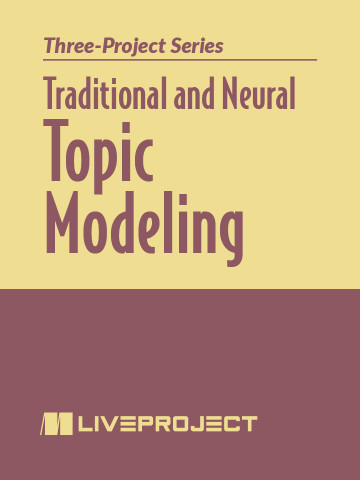- prerequisites
- intermediate Python • linear algebra • probability • basics of machine learning • basics of deep learning
- skills learned
- implementing simplified versions of NMF and LDA algorithms from scratch • preprocessing a text corpus and converting into a document-to-word matrix • visualizing derived topics with a variety of techniques • evaluating generated topics using Coherence and Diversity metrics
pro $24.99 per month
- access to all Manning books, MEAPs, liveVideos, liveProjects, and audiobooks!
- choose one free eBook per month to keep
- exclusive 50% discount on all purchases
- renews monthly, pause or cancel renewal anytime
lite $19.99 per month
- access to all Manning books, including MEAPs!
team
5, 10 or 20 seats+ for your team - learn more

In this series of liveProjects, you’ll explore different techniques for topic modeling. Topic modeling is an incredibly useful unsupervised machine learning technique that allows you to find topics in text without needing any manual labelling. It’s a great way to quickly derive insights from text data and share them with key stakeholders. You’ll work with a variety of different text data corpuses to go hands-on with NMF algorithms from scikit-learn, LDA algorithms from Gensim, and even new neural network techniques using the OCTIS (Optimizing and Comparing Topic Models is Simple!) library.
here's what's included

In this liveProject you’ll use scikit-learn’s non-negative matrix factorization algorithm to perform topic modeling on a dataset of Twitter posts. You’ll step into the role of a data scientist tasked with summarizing Twitter discussions for the customer support team of an airline company and use this powerful algorithm to rapidly make sense of a large and complex text corpus. You’ll build a text preprocessing pipeline from scratch, visualize topic models, and finally compile a report of support topics for the customer services team.

In this liveProject, you’ll use the latent dirichlet allocation (LDA) algorithm from the Gensim library to model topics from a magazine’s article back catalog. Thanks to your work on topic modeling, the new Policy and Ethics editor will be better equipped to strategically commission new articles for under-represented topics. You’ll build your text preprocessing pipeline, use topic coherence to find the number of topics, and visualize and curate the algorithm’s output for your stakeholders to easily read.

In this liveProject, you’ll use the neural network-inspired Contextual Topic Model to identify and visualize all of the articles in a scientific magazine’s back catalog. This cutting-edge technique is made easy by the OCTIS (Optimizing and Comparing Topic Models is Simple!) library. Once you’ve established your text-processing pipeline, you’ll use coherence and diversity metrics to evaluate the output of your topic models, tune your neural network’s hyperparameters to improve results, and visualize your results for printing on posters and other media.

team
- five seats for your team
- access to all Manning books, MEAPs, liveVideos, liveProjects, and audiobooks!
- choose another free product every time you renew
- choose twelve free products per year
- exclusive 50% discount on all purchases
- renews monthly, pause or cancel renewal anytime
- renews annually, pause or cancel renewal anytime
-
![]() Traditional and Neural Topic Modeling project for free
Traditional and Neural Topic Modeling project for free
Prerequisites
This liveProject series is for data scientists and developers who are confident programming with Python and the Python data ecosystem. To begin this liveProject you will need to be familiar with the following:
TOOLS
- Intermediate Python
- Basics of Jupyter Notebook TECHNIQUES
- Linear algebra
- Probability
- Referencing Matrix cells by row and column index
- Matrix subtraction, multiplication, and division
- Basics of machine learning and deep learning
 features
features
- Self-paced
- You choose the schedule and decide how much time to invest as you build your project.
- Project roadmap
- Each project is divided into several achievable steps.
- Get Help
- While within the liveProject platform, get help from fellow participants and even more help with paid sessions with our expert mentors.
- Compare with others
- For each step, compare your deliverable to the solutions by the author and other participants.
- book resources
- Get full access to select books for 90 days. Permanent access to excerpts from Manning products are also included, as well as references to other resources.

 Traditional and Neural Topic Modeling project for free
Traditional and Neural Topic Modeling project for free